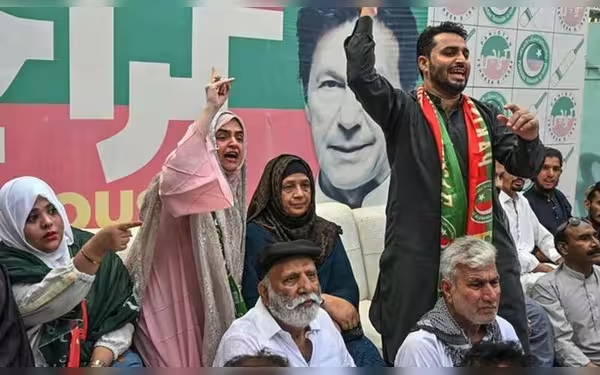Sunday, November 24, 2024 12:14 AM
PTI Welcomes IHC Bail Decision for Imran Khan
- PTI praises IHC for granting bail to Imran Khan.
- Party claims remaining cases are politically motivated.
- Government's actions against peaceful protests condemned.
 Image Credits: brecorder
Image Credits: brecorderPTI expresses approval of IHC's bail decision for Imran Khan, condemning government actions against peaceful protests.
On Wednesday, the Pakistan Tehreek-e-Insaf (PTI) party expressed its approval of the Islamabad High Court's (IHC) recent decision to grant bail to its founding chairman, Imran Khan. This decision pertains to the controversial Toshakhana2.0 case, which PTI has labeled as 'fake and fabricated.' The party's spokesman, Sheikh Waqas Akram, emphasized that the remaining cases against Imran Khan and other party leaders are similarly concocted and politically motivated.
Akram stated that justice would ultimately prevail, predicting that Imran Khan would also be granted bail in four additional cases scheduled for hearing at an anti-terrorism court on November 29. He urged the government to prioritize justice for Imran Khan to prevent any potential unrest or public discontent. According to him, the cases against the PTI founder are being dismissed one by one, revealing their baseless nature. He pointed out that despite facing over 200 alleged bogus cases, no substantial evidence has been presented against him.
Furthermore, Akram condemned the government's apparent misuse of national resources, particularly criticizing the extensive containerization efforts that have transformed Islamabad into a fortress ahead of PTI's planned peaceful march on November 24. He accused the current rulers, whom he described as lacking a public mandate, of preparing for a confrontation aimed at obstructing peaceful protesters from entering the capital.
He firmly stated that using colonial-era tactics against peaceful demonstrators is unacceptable, as the Constitution of Pakistan guarantees every citizen the fundamental right to peaceful assembly. Akram argued that deploying tens of thousands of security personnel, along with over 1,200 containers and significant amounts of anti-riot gear, would not only waste national resources but also worsen the plight of the impoverished and inflation-stricken populace.
In a reminder of PTI's commitment to democratic values, Akram noted that during PTI's time in power, the Pakistan Peoples Party (PPP) and Jamiat Ulema-e-Islam (JUI-F) were able to march on Islamabad without facing any resistance. He attributed this to Imran Khan's belief in the importance of exercising the democratic right to peaceful protest.
As the political landscape in Pakistan continues to evolve, the situation surrounding Imran Khan and the PTI remains a focal point of public interest. The ongoing legal battles and the government's response to peaceful protests will likely shape the future of political discourse in the country. It is essential for citizens to stay informed and engaged, as the outcomes of these events could have lasting implications for democracy and governance in Pakistan.













